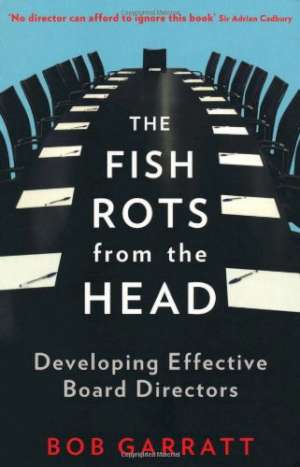19 June 2011
The Fish Rots from the Head
Developing Effective Board Directors
Bob Garratt
2010, Profile Books, 320 pages, £9.99
ISBN 9781846683299
Reviewer: Vicky Pryce

Allow me to declare a personal interest at the start. Professor Bob Garratt was my immediate predecessor as Master of the Worshipful Company of Management Consultants. He did that brilliantly and has been a wise counsel to me since I have taken on the duties of Master, while still managing to fly around the world helping countries to strengthen their governance structures. So it is no surprise to me that he writes so wisely about corporate governance and the role of company directors.
This new, third edition of his book is very timely. As Professor Garratt notes in his introduction, a lack of effective corporate governance has been seen as one of the causes of the financial crisis that plunged most of the world into recession in 2008 and 2009. While Bob does not see more effective boards of directors as the solution to all ills, he does believe, based on years of experience working with companies, that improvement in corporate governance is one of the necessary elements in preventing similar crises in the future. The new edition also highlights some of the key features of the 2006 Companies Act and the additional responsibilities it placed on directors.
The central concept in this book is that of the Learning Board. The Board must not just be capable of exercising oversight and giving direction; it must also develop systems for fast feedback, assimilation of information and identification of critical issues for the future of the business. Rigorous processes for the selection and induction of directors need to underpin this.
Professor Garratt lays bare the demands of being a company director today. It is an important role and effective performance requires time, energy and intelligence (both cerebral and emotional). Directors have to weigh up competing demands on the business, balance the short and the long term, the demands of the owners and other stakeholders, financial returns versus issues such as reputation or impact on the environment.
This is a well-paced and extremely readable book. It is also great entertainment: I didn’t know (but perhaps should have suspected) that one of the origins of the term ‘management’ comes from the old Italian word for the breaking of wild horses and their domestication. As Bob notes, there are still many practitioners of this style around! I would suggest that this will be of great interest to all those, including the Financial Reporting Council following that Lord Davies report, who are now rethinking the role that more diversity . including more women . can do to enhance company performance. But in any case this book should be essential reading for anyone who is a company director or who aspires to be one. However, being so keenly priced, it would be a good buy for anyone interested in learning more about corporate governance, how it can go wrong and how it might be improved.
